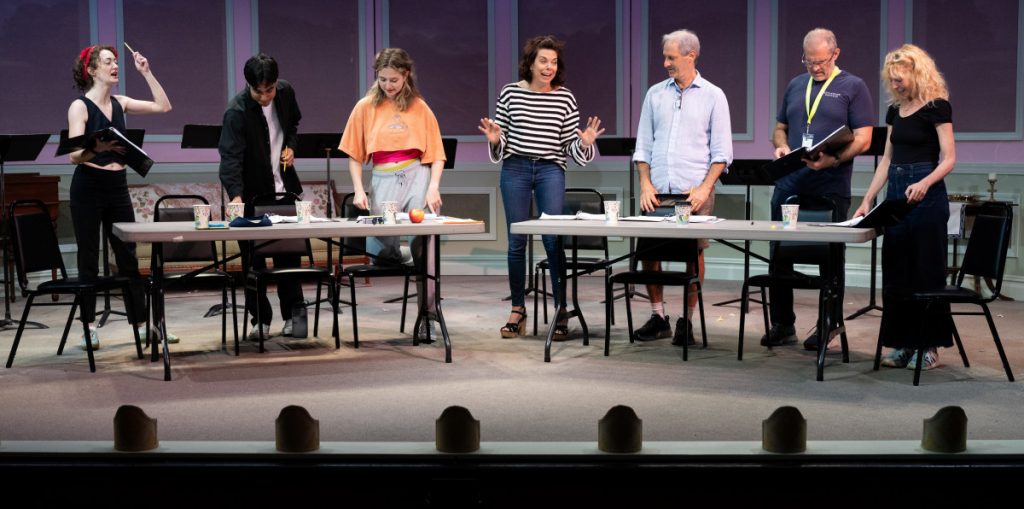
Julia Weber
Staff writer
Chautauqua Theater Company’s current New Play Workshop Cannabis Passover will be read at 11:30 a.m. Saturday in Bratton Theater.
The play, written by Sofya Levitsky-Weitz, and workshopped at Chautauqua with the support of the Roe Green Foundation, is a dramedy centering a family of Reform Jews who have gathered to celebrate Passover together.
For CTC Guest Actors Jill Abramovitz and Maddie Corman, it’s inspiring to portray their respective characters, Suzanne and Dee. Both Abramovitz and Corman are proud to be representing the Jewish community onstage.
“We feel excited about these incredibly relatable, modern representations of Jews on the stage, and that is something that I’m very proud to be part of,” Abramovitz said.
The two both said they are particularly thrilled to be playing “women of a particular age” who Cornman said “really enjoy one another,” and Abramovitz called the characters “full, grounded, nuanced human beings.”
The actors in the play cited their shared living space as a surprisingly fruitful source of inspiration for the group of four Guest Actors. Through sharing meals together, they bonded and, in turn, are able to take those experiences to the stage to share yet another meal together.
The actors agreed that Chautauqua’s grounds serve as a source of inspiration and allow for a more relaxed, comfortable atmosphere in which they can focus and channel their artistry through their surroundings.
Guest Actor Marc Kudisch, who plays Michael in Cannabis Passover, nodded specifically to Chautauqua as a source of inspiration in his artistic process.
“What a beautiful little community,” he said. “It’s relaxing, it’s nice to go to work.”
“There’s nothing more important than process, and so often, people are focused on results, and they lose track of the intention and the passion that they had to want to tell the story to begin with,” Kudisch said. “This is just such a lovely place to relax. The energy of the lake and the energy of the area and the woods, it just allows you to let your shoulders settle a little bit so that when you are working, you can focus in a very relaxed way.”
Guest Actor Rich Topol, who plays Paul in Cannabis Passover and participated in the 2016 NPW The Glow Overhead, agrees.
“It’s one of the few places where it feels like everybody is here because they’re all curious and driven to be open to the world around them, and to learn more rather than less, and to know more than what they already know,” he said.
Chautauqua’s environment is very conducive to the artistic process, and Topol finds the community’s respect for art and willingness to uplift it to be a source of inspiration.
The actors also agreed that specific art makes for universal art, and they hope that audience members will connect with the characters onstage through the course of the reading. The universality of the play and its themes of connection, love and family transcend the plot, resonating with attendees no matter their backgrounds or life experiences.
“I think all good art, the more specific you can be, the more recognizable it is to everyone in a sense because you will see your own family — even if the traditions are different, the rhythms are different, the feelings are universal,” Corman said.
Kudisch felt similarly, agreeing that the more specific a character or plot is, the more that it will resonate with audiences from all backgrounds.
“Life is in the details. Specifics are everything. The more specific you are, the more universal it all becomes,” Kudisch said. “We’re all human beings. No matter what your idealism is, no matter what your culture is, everyone is a human being and we all feel the same emotions.”
Going into production, the cast had many mutual connections and friends, and their bonds have only grown stronger by the minute.
“There’s this (Yiddish) word ‘beshert,’ which means ‘meant to be,’ ” Abramovitz said.
She listed moments of the cast crossing paths before this workshop, and it seems serendipitous for them to be together now.
“We were all available, offers came in … all these little coincidences,” Abramovitz said.
To them, it’s beshert they’ve ended up in Chautauqua together in a play celebrating Judaism, family and connection.




